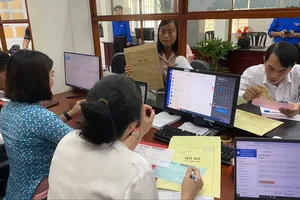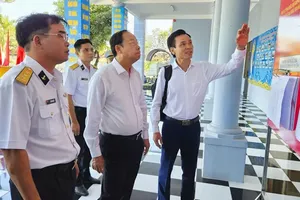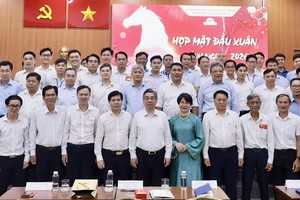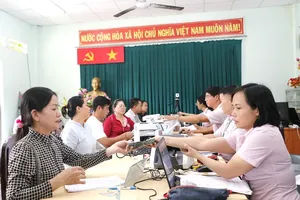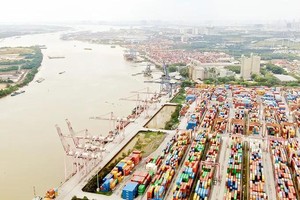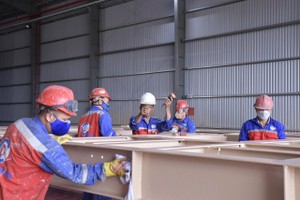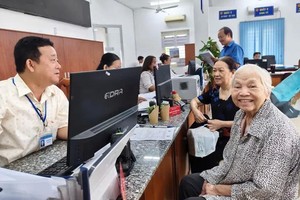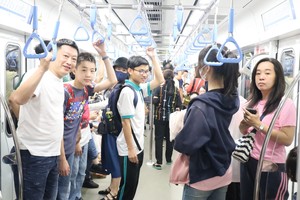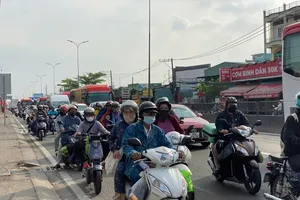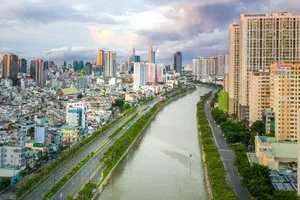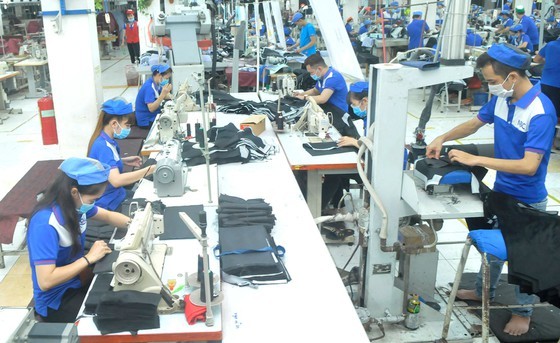 Production at Nha Be Garment Corporation. (Photo: SGGP)
Production at Nha Be Garment Corporation. (Photo: SGGP)
The problem of increasing production costs
The Southern Institute of Social Sciences surveyed businesses to have a quick assessment of the first stage of the economic recovery and development process in HCMC. Thereby, it also promptly reflects basic and urgent issues from reality and provides policy feedback in a specific way.
HCMC has issued a set of criteria, including ten groups, to assess safety standards in Covid-19 prevention at production facilities. The government also issued many policies to support businesses to overcome difficulties. These are necessary actions for businesses to recover and develop. However, many enterprises evaluate that, in reality, many criteria have low feasibility.
Specifically, the issues include negative Covid-19 test before going to work; the density of 4 square meters per worker and a distance of 2 meters per employee at the workplace; having a contract with a medical unit or a full-time medical staff or the three-on-site model; controlling the circulation and accommodation of workers. The above requirements have caused production costs to hike too much, or these requirements are hard to meet in practice. At the same time, they reflect the safe approach but pay little attention to production efficiency and the actual conditions of enterprises when applying these criteria.
Regarding the effectiveness of support policies, most enterprises said that supports in terms of biological products and disease control, such as the import of Covid-19 vaccines, testing equipment, self-testing and recognition of test results, medical declaration, green channel establishment, and supply chain, are not highly effective. Especially, most businesses in HCMC are seriously affected by the Covid-19 pandemic, but only nearly 17 percent of them have received financial support. Moreover, the above supports can only solve immediate difficulties, while businesses need new loans to invest in the recovery and development phases.
In general, enterprises encounter difficulties, ranging from pandemic prevention to input factors, such as capital, labor, raw materials, supply chain, to conditions on production organization and market. The most difficult problem for enterprises currently is the increase in production costs due to measures to prevent the Covid-19 pandemic, as well as obstacles in inter-provincial transportation of goods and labor shortage.
Helping workers settle down
The Covid-19 pandemic is a special situation that must apply pandemic prevention measures simultaneously and ensure the operation of the social economy. It requires special attention on improving the coordination, management, and administration abilities of State management agencies to safely adapt to Covid-19, recover, and develop the social economy.
The Southern Institute of Social Sciences surveyed businesses to have a quick assessment of the first stage of the economic recovery and development process in HCMC. Thereby, it also promptly reflects basic and urgent issues from reality and provides policy feedback in a specific way.
HCMC has issued a set of criteria, including ten groups, to assess safety standards in Covid-19 prevention at production facilities. The government also issued many policies to support businesses to overcome difficulties. These are necessary actions for businesses to recover and develop. However, many enterprises evaluate that, in reality, many criteria have low feasibility.
Specifically, the issues include negative Covid-19 test before going to work; the density of 4 square meters per worker and a distance of 2 meters per employee at the workplace; having a contract with a medical unit or a full-time medical staff or the three-on-site model; controlling the circulation and accommodation of workers. The above requirements have caused production costs to hike too much, or these requirements are hard to meet in practice. At the same time, they reflect the safe approach but pay little attention to production efficiency and the actual conditions of enterprises when applying these criteria.
Regarding the effectiveness of support policies, most enterprises said that supports in terms of biological products and disease control, such as the import of Covid-19 vaccines, testing equipment, self-testing and recognition of test results, medical declaration, green channel establishment, and supply chain, are not highly effective. Especially, most businesses in HCMC are seriously affected by the Covid-19 pandemic, but only nearly 17 percent of them have received financial support. Moreover, the above supports can only solve immediate difficulties, while businesses need new loans to invest in the recovery and development phases.
In general, enterprises encounter difficulties, ranging from pandemic prevention to input factors, such as capital, labor, raw materials, supply chain, to conditions on production organization and market. The most difficult problem for enterprises currently is the increase in production costs due to measures to prevent the Covid-19 pandemic, as well as obstacles in inter-provincial transportation of goods and labor shortage.
Helping workers settle down
The Covid-19 pandemic is a special situation that must apply pandemic prevention measures simultaneously and ensure the operation of the social economy. It requires special attention on improving the coordination, management, and administration abilities of State management agencies to safely adapt to Covid-19, recover, and develop the social economy.
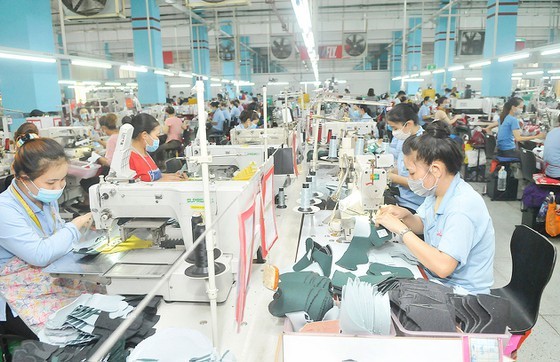 Footwear production for export at Freetrend Industrial Company in Thu Duc City. (Photo: SGGP)
Footwear production for export at Freetrend Industrial Company in Thu Duc City. (Photo: SGGP)
Specifically, authorities need to stand from the perspective of enterprises, considering enterprises as full partners. Based on the current high Covid-19 vaccination rate in HCMC, the set of safety criteria needs to be sharply adjusted in the direction of "safety and effectiveness and in line with reality" to ensure the dual goal because above all else, enterprises will take the first responsibility and suffer the most direct consequences for production and business activities. The pressing difficulties of workers during social distancing and the migration waves to prevent the pandemic have also revealed inadequacies in social security policies and workers' insecurity. It shows that it is necessary to develop basic and long-term social security policies rather than short-term support packages for workers. Besides retaining workers by welfares and maintaining a close relationship, the government and businesses need to coordinate to attract workers to return to work. It is also necessary to support Covid-19 vaccination, testing, and boarding houses for workers and pay attention to kindergartens and schools for workers’ children. Especially, the living conditions of workers need to be improved drastically, in which social housing is the most important factor for them to settle down. It is first a matter of State agencies. However, it also needs the participation of large enterprises and the private sector to increase the housing areas and improve the quality of the existing areas. The recent disruption of labor and commodity supply chains also requires regional linkage through the investment and development of industrial clusters and traffic connections to redistribute the workforce more efficiently.
The HCMC economy in general and enterprises, in particular, have a huge demand for investment capital in socio-economic recovery and development. Many businesses no longer have assets to mortgage for new loans.
Meanwhile, commercial banks have not loosened credit conditions due to concerns over bad debts, creating a large credit gap that requires the intervention of the State. The Covid-19 pandemic is a special situation, so it requires a special solution. Credit capital from the State budget is a source of oxygen for enterprises that are seriously ill. The ratio of the support package to the GDP of Vietnam is much lower than other countries in the world. The public debt ceiling will possibly increase in the short term to create a large enough loan source from the budget.
Meanwhile, commercial banks have not loosened credit conditions due to concerns over bad debts, creating a large credit gap that requires the intervention of the State. The Covid-19 pandemic is a special situation, so it requires a special solution. Credit capital from the State budget is a source of oxygen for enterprises that are seriously ill. The ratio of the support package to the GDP of Vietnam is much lower than other countries in the world. The public debt ceiling will possibly increase in the short term to create a large enough loan source from the budget.
 Assoc.Prof.-Dr. Le Thanh Sang, Director of the Southern Institute of Social Sciences. (Photo: SGGP)
Assoc.Prof.-Dr. Le Thanh Sang, Director of the Southern Institute of Social Sciences. (Photo: SGGP)

